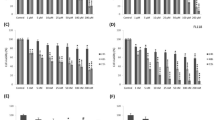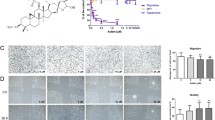Abstract
The effects of all-trans retinoic acid (ATRA) on cancer are complex. ATRA has anti-cancer effects as it promotes cancer cell differentiation. However, ATRA also up-regulates expression of vascular endothelial growth factor (VEGF) in cancer cells, which leads to angiogenesis and can, thus, facilitate cancer growth. Genistein, a crucial non-nutrient component in soybean, exhibits anti-cancer effects by inhibiting protein tyrosine kinase that is involved in up-regulation of VEGF. We hypothesized that genistein, applied simultaneously with ATRA, would counter its undesired angiogenic effects and, thus, enhance the anti-cancer effects of ATRA. The purpose of this study was to document potential synergistic effects of genistein and ATRA in A549 lung adenocarcinoma cells. We further explored the role of genistein on countering the ATRA-induced VEGF expression. We demonstrate that genistein enhances the ATRA-induced growth inhibition of A549 cells by promoting apoptosis. Further, the combined use of ATRA and genistein leads to cancer cell arrest in G0/G1 and G2/M cell cycle phases. Finally, expression of VEGF (both mRNA and protein) was diminished in A549 cells exposed to both ATRA and genistein. In conclusion, our results demonstrate that genistein effectively enhances anti-cancer effects of ATRA, particularly, by countering the ATRA-induced up-regulation of VEGF. Our study provides an experimental basis for combined use of ATRA and genistein in the treatment of lung cancer.





Similar content being viewed by others
References
Toma, S., Raffo, P., Isnardi, L., & Palumbo, R. (1999). Retinoids in lung cancer chemoprevention and treatment. Annals of Oncology, 10(Suppl 5), S95–S102.
Russell, R. M. (2004). The enigma of beta-carotene in carcinogenesis: What can be learned from animal studies. Journal of Nutrition, 134, 262S–268S.
Maeno, T., Tanaka, T., Sando, Y., Suga, T., Maeno, Y., Nakagawa, J., et al. (2002). Stimulation of vascular endothelial growth factor gene transcription by all trans retinoic acid through Sp1 and Sp3 sites in human bronchioloalveolar carcinoma cells. American Journal of Respiratory Cell and Molecular Biology, 26, 246–253.
Saito, A., Sugawara, A., Uruno, A., Kudo, M., Kagechika, H., Sato, Y., et al. (2007). All-trans retinoic acid induces in vitro angiogenesis via retinoic acid receptor: Possible involvement of paracrine effects of endogenous vascular endothelial growth factor signaling. Endocrinology, 148, 1412–1423.
Nagata, C., Inaba, S., Kawakami, N., Kakizoe, T., & Shimizu, H. (2000). Inverse association of soy product intake with serum androgen and estrogen concentrations in Japanese men. Nutrition and Cancer, 36, 14–18.
Tikkanen, M. J., & Adlercreutz, H. (2000). Dietary soy-derived isoflavone phytoestrogens. Could they have a role in coronary heart disease prevention? Biochemical Pharmacology, 60, 1–5.
Barnes, S., Sfakianos, J., Coward, L., & Kirk, M. (1996). Soy isoflavonoids and cancer prevention. Underlying biochemical and pharmacological issues. Advances in Experimental Medicine and Biology, 401, 87–100.
Wietrzyk, J., Boratynski, J., Grynkiewicz, G., Ryczynski, A., Radzikowski, C., & Opolski, A. (2001). Antiangiogenic and antitumour effects in vivo of genistein applied alone or combined with cyclophosphamide. Anticancer Research, 21, 3893–3896.
Buchler, P., Reber, H. A., Buchler, M. W., Friess, H., Lavey, R. S., & Hines, O. J. (2004). Antiangiogenic activity of genistein in pancreatic carcinoma cells is mediated by the inhibition of hypoxia-inducible factor-1 and the down-regulation of VEGF gene expression. Cancer, 100, 201–210.
Akiyama, T., & Ogawara, H. (1987). Drugs inhibiting the function of oncogene products, especially protein tyrosine kinases. Seikagaku, 59, 1016–1020.
Lippman, S. M., Kessler, J. F., & Meyskens, F. L., Jr. (1987). Retinoids as preventive and therapeutic anticancer agents (Part I). Cancer Treatment Reports, 71, 391–405.
Levine, A. E., Crandall, C. A., Brattain, D., Chakrabarty, S., & Brattain, M. G. (1986). Retinoic acid restores normal growth control to a transformed mouse embryo fibroblast cell line. Cancer Letters, 33, 33–43.
Inui, N., Sasaki, S., Suda, T., Chida, K., & Nakamura, H. (2003). The loss of retinoic acid receptor alpha, beta and alcohol dehydrogenase3 expression in non-small cell lung cancer. Respirology, 8, 302–309.
Prakash, P., Russell, R. M., & Krinsky, N. I. (2001). In vitro inhibition of proliferation of estrogen-dependent and estrogen-independent human breast cancer cells treated with carotenoids or retinoids. Journal of Nutrition, 131, 1574–1580.
Ravindranath, M. H., Muthugounder, S., Presser, N., & Viswanathan, S. (2004). Anticancer therapeutic potential of soy isoflavone, genistein. Advances in Experimental Medicine and Biology, 546, 121–165.
Schmidt, F., Knobbe, C. B., Frank, B., Wolburg, H., & Weller, M. (2008). The topoisomerase II inhibitor, genistein, induces G2/M arrest and apoptosis in human malignant glioma cell lines. Oncology Reports, 19, 1061–1066.
Gaudette, D. C., & Holub, B. J. (1990). Effect of genistein, a tyrosine kinase inhibitor, on U46619-induced phosphoinositide phosphorylation in human platelets. Biochemical and Biophysical Research Communications, 170, 238–242.
Pavese, J. M., Farmer, R. L., & Bergan, R. C. (2010). Inhibition of cancer cell invasion and metastasis by genistein. Cancer and Metastasis Reviews, 29, 465–482.
Li, W., & Weber, G. (1998). Synergistic action of tiazofurin and genistein on growth inhibition and differentiation of K-562 human leukemic cells. Life Science, 63, 1975–1981.
Gianni’, M., Kalac, Y., Ponzanelli, I., Rambaldi, A., Terao, M., & Garattini, E. (2001). Tyrosine kinase inhibitor STI571 potentiates the pharmacologic activity of retinoic acid in acute promyelocytic leukemia cells: Effects on the degradation of RARalpha and PML-RARalpha. Blood, 97, 3234–3243.
Hoeben, A., Landuyt, B., Highley, M. S., Wildiers, H., Van Oosterom, A. T., & De Bruijn, E. A. (2004). Vascular endothelial growth factor and angiogenesis. Pharmacological Reviews, 56, 549–580.
Yu, X., Zhu, J., Mi, M., Chen, W., Pan, Q., & Wei, M. (2010). Anti-angiogenic genistein inhibits VEGF-induced endothelial cell activation by decreasing PTK activity and MAPK activation. Medical Oncology. [Epub ahead of print].
Zhou, N., Yan, Y., Li, W., Wang, Y., Zheng, L., Han, S., et al. (2009). Genistein inhibition of topoisomerase II alpha expression participated by Sp1 and Sp3 in HeLa cell. International Journal of Molecular Sciences, 10, 3255–3268.
Author information
Authors and Affiliations
Corresponding author
Additional information
Ren-Jie Zhou and Xue-Qin Yang contributed equally to this work.
Rights and permissions
About this article
Cite this article
Zhou, RJ., Yang, XQ., Wang, D. et al. Anti-tumor Effects of All-trans Retinoic Acid are Enhanced by Genistein. Cell Biochem Biophys 62, 177–184 (2012). https://doi.org/10.1007/s12013-011-9279-0
Published:
Issue Date:
DOI: https://doi.org/10.1007/s12013-011-9279-0




